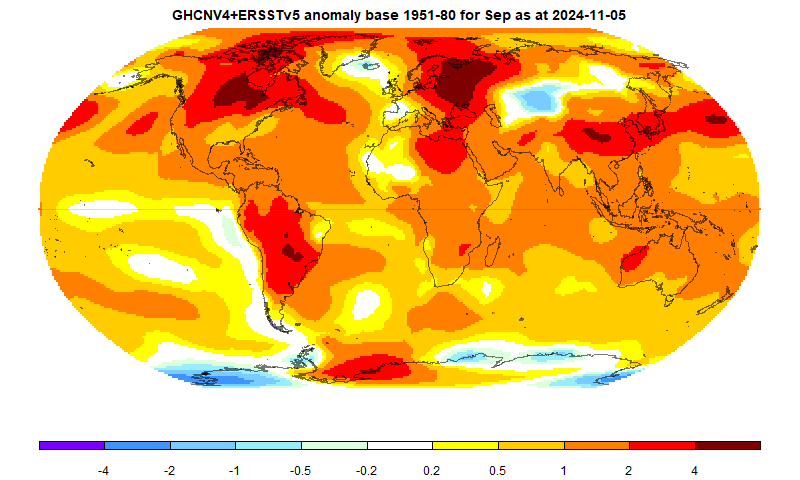As with TempLS, September broke a sequence of fifteen record months- September 2023 was 1.48°C, but next was 2020 at 0.96°C.
As usual here, I will compare the GISS and earlier TempLS plots below the jump.
Here is GISS V4

And here is the TempLS V4 FEM-based plot

This post is part of a series that has now run for twelve years. The GISS data completes the month cycle, and is compared with the TempLS result and map. GISS lists its reports here, and I post the monthly averages here.
The TempLS mesh data is reported here, and the recent history of monthly readings is here. Unadjusted GHCN is normally used, but if you click the TempLS button there, it will show data with adjusted, and also with different integration methods. There is an interactive graph using 1981-2010 base period here which you can use to show different periods, or compare with other indices. There is a general guide to TempLS here.
The reporting cycle starts with the TempLS report, usually about the 8th of the month. Then when the GISS result comes out, usually about the 15th, I discuss it and compare with TempLS. The TempLS graph now comes from a high resolution regular grid on the sphere; the residuals are displayed more directly using a triangular grid in a WebGL plot here.
A list of earlier monthly reports of each series in date order is here:
126C is damn warm :).
ReplyDeleteLove your posts.
Thanks, yes. Dot needed.
DeleteLooks like October will be pretty warm too, if not necessarily another record... but does it basically cement 2024 as the warmest year on record in the surface temperature datasets?
ReplyDeleteGISS would have to average 0.842C for the rest of the year to make 2024 less than 2023. That is less than the annual average of each of the last ten years. Unlikely, with it still running and 1.26C for September.
DeleteOctober is actually making a run at being a record... depending on how warm these last two days are...
DeleteGISS is running at 1.25C for the year to date after 9 months. The record from 2023 was 1.17C. I'm willing to venture a small bet that 2024 will be a new GISS record.
ReplyDelete